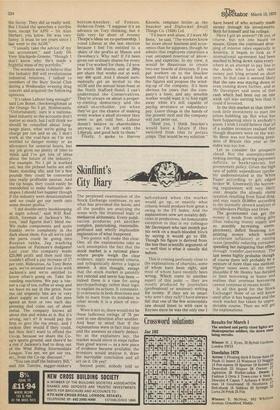Skinflint's City Diary
The perplexed examination of the Stock Exchange continues, to see what has provoked the boom, and all the pundits are analysing the scene with the irrational logic of mediaeval alchemists. Every publication produces yet another. complex, painstaking, reasonable, profound and wholly implausible explanation of what happened.
Two points will make this clear. One: all the explanations take as tacit assumption the fact that the stock market is a rational place where people weigh the clear evidence, apply measured criteria, and syllogistically derive a logical answer. A nice thought, except that the stock market is patently not rational and never has been — indeed there is a case for using psychopathology rather than logic to explain its actions. It consistently overreacts in both directions and fails to learn from its mistakes; in other words it is a place of emotions.
Were it not so, there would not be these ludicrous swings of 70 per cent in one direction after another. And bear in mind that if the explanations were in fact that easy and the answers as clearly deducihie as the explainers say, the market would move in steps rather than great waves — as a new piece of evidence became available, the investors would analyse it, draw the inevitable conclusion and all act on it. Oh yes?
Second point: nobody told us beforehand when the market would go up, or exactly what criteria would produce how great a swing in the FT Index. And the explanations now are notably deficient in predictions. An honourable exception to that is my colleague Mr Davenport who last month put his neck on a much-blooded block by saying it would go to 350. Though his figure is derived from the less than scientific argument of — well that is what it usually did before.
This is coming perilously close to the explanations of chartists,. some of whom have been right, and most of whom have recently been wrong. Which come to another aspect of this point — they are mostly produced by journalists (professional or amateur) writing for money. If they are so smart why aren't they rich? I have always felt that one of the few economists one should listen to with care is Keynes since he was the only one I
have heard of who actually made money through his investments. Both for himself and his college.
Have I got an answer? Oh yes, of course, but not one based on reason. Given the continued dropping of interest rates especially in America, it began to look as if international agreement had been reached to bring down rates everywhere in an attempt to pay less to the Arabs who have left their money just lying around on short term. In that case it seemed likely that the rate was staying down or even coming down further, and as Mr Davenport said some of that cash which had been out on one week call was earning less than it could if invested.
In the thin market at that time it took little investment to start the prices bubbling up. But what has been happening since is anybody's guess. I wish I could believe that all of a sudden investors realised that though disasters were on the way, Mr Benn was not becoming president of Britain this year so the index was too low.
Let us consider the prospects ahead. Not the unemployment, sinking sterling, growing payments deficits, or bankruptcies, but government policy. Given the high rate of public expenditure (probably underestimated in the White Paper according to gilt edged broker W. Greenwell) the borrowing requirement will very likely soar, despite the already rising taxation resulting from fiscal drag, and may reach £8,000m according to the normally shrewd analysts at stockbrokers Phillips and Drew. The government can get the money it needs from selling gilts (thus reducing money supply and so possibly increasing unemployment), deficit financing printing money which would accelerate inflation) or raising taxes (possibly reducing consumer spending but mitigating that effect through transfer 'payments). The last seems highly probable though of course there will probably be a mixture of more than one method. Higher taxes seem all the more plausible if Mr Healey has decided to limit borrowing at home and realises that overseas borrowing cannot continue at recent levels.
Is all this good for the Stock Exchange? None of us will know' until after it has happened and the stock market has taken its unpredictable course. Then we will get the explanations.


































 Previous page
Previous page